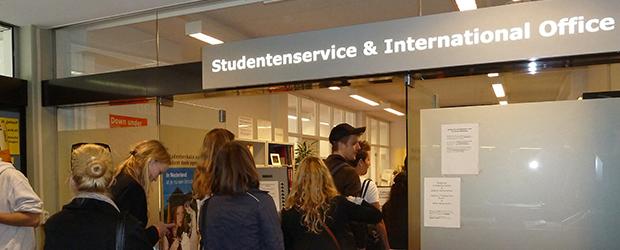Analysis
How can Dutch universities handle the influx of foreign students?

The number of international students enrolled in Dutch universities has risen again, according to statistics unveiled last week — and, if the forecasts are correct, the growing trend is showing no signs of slowing down.
Some programmes in the Netherlands have a so-called numerous fixus, which means they only allow a certain number of freshers each year. The remaining programmes take in anyone with the right qualifications. International students have been outnumbering Dutch students in a few programmes with numerous fixus, leading to the criticism that Dutch students are being "robbed" of a chance to study certain disciplines. In addition, there is a massive housing shortage going on, causing many students to struggle to find a place for months. That's why some cities and universities in the Netherlands are calling for help. They would like the Dutch government to give them more instruments to address the situation.
His own plan
But the Dutch Minister of Education, Robbert Dijkgraaf, doesn't seem to be in a hurry. He has recently withdrawn a draft bill titled "Language and Accessibility", which had been proposed by his predecessor. That bill got really close to being adopted: all it was missing was the approval of the Senate. The current minister is not going to unveil his own plans before the beginning of 2023, to the university's distress: they're not happy at all about having to wait so long to be able to do something.
Despite the criticism, Dijkgraaf would like to take his time to make an informed decision. He explained his stance with a typically Dutch metaphor: “I could fill up the toolkit and then every farmer would be able to patrol their own section of the dike, but that doesn’t mean the dike would be well protected”, said the minister in June. “We need to have a national strategy when it comes to internationalisation: what do we want to achieve together? Such a strategy is lacking right now.”
Instruments
Dutch universities would certainly like to have more tools in their toolkit. For example, they would like to be granted permission to distinguish between European and non-European students, in order to limit the former without affecting the latter. Such a policy would benefit 11 study programmes across the country, such as Aerospace Engineering and Mechanical Engineering, argued the association of Dutch universities (UNL) at a press conference.
They would also want to establish Dutch-language tracks, which would be meant for Dutch native speakers, and English-language track, which would have a numerus fixus. That way, they would be able to maintain the number of spots for Dutch students. Currently, 13 study programmes need such a measure, according to UNL. But UNL chair Pieter Duisenberg thinks it is likely that more programmes would be interested in making use of such options.
To each their own section of the dike
But, if that happened, we'd have exactly the situation Dijkgraaf wants to avoid: everyone protecting their own section of the dike. The government's reasoning is that the Dutch labour market is suffering from major shortages, so the country needs foreign talent. Moreover, international students could give a much-welcomed boost to the economy of shrinking regions. Presumably, the minister is looking for a solution of another nature. But what?
One of the options is to turn some of the universities of applied sciences (hoogscholen) into practice-based universities. This way, some of the students who currently go to research universities could go to universities of applied sciences, which would spread the workload. There are many universities of applied sciences in the Netherlands where the number of enrolments has been consistently dropping. This possibility has already been mooted several times.
A single institution
Another option is to have Dutch higher education operate as a single institution, which would enable the system to distribute the work in a more effective way. If a foreign students would not be able to get a spot at, say, the University of Amsterdam or the Delft Institute of Technology, they would be sent over to another Dutch city. That is what used to happen with the Bachelor's programme in Medicine study, for example. Prospective doctors didn't always get into their first-choice and sometimes had to go to another city.
If Dijkgraaf wants to attract more foreign talent to the Netherlands even though certain study programmes are bursting at the seams, he will have to come up with some kind of instrument to distribute those students across the country. A one-stop shop for all enrolments is, therefore, a possible solution.